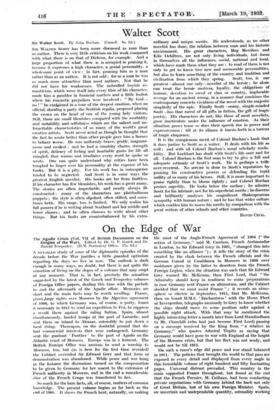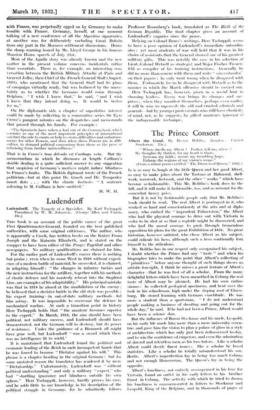On the Ed ge of War
The Agadir Crisis (Vol. VII of British Documents on the Origins of the War). Edited by Dr. G. P. Gooch and Dr. Harold Temperley. (131. Stationery Office. 17a. tid.)
A DETAILED study of some of the diplomatic episodes of the decade before the War justifies a little guarded optimism regarding the days we live in now. The outlook is dark enough in many ways, no doubt, but there is not quite the sensation of living on the slopes of a volcano that may erupt at any moment. That is, in fact, precisely the sensation suggested by the latest of the Gooch and Temperley volumes of Foreign Oflice papers, dealing this time with the prelude to and the aftermath of the Agadir affair. Memories short and the main facts may be worth recalling. France, given „large rights over Morocco by the Algeciras agreement of 1906, to which Germany was, of course, a-party, found it necessary in 1911 to send an expedition to Fez, to suppress a revolt there against the ruling Sultan. Spain, almost simultaneously, landed troops at the port of Laraiche, and sent them on inland to Aleazar, ostensibly to put down a local rising. Thereupon, on the doubtful ground that she had commercial interests that were endangered, Germany sent the gunboat Panther' to the port of Agadir on the Atlantic coast of Morocco. Europe was in a ferment. The British Foreign Office was anxious to send a warship to Morocco, too, but (as is here for the first time revealed) the Cabinet overruled Sir Edward Grey and that form of demonstration was abandoned. While peace and war hung in the balance the discussions turned on the compensation to be given to Germany for her assent to the extension of French authority in Morocco, and in the end -a considerable slice of the French Congo was transferred to her.
So much for the bare facts, all, of course, matters of common knowledge. The present volume begins as far back as the end of 1906. It shows the French bent, naturally, on making
the most of the Anglo-French Agreement of 1904 (" the action of Germany," said M. Cambon, French Ambassador in London, to Sir Edward Grey in 1907, " changed this into something like an affiance ") ; it tells the story of the crisis created by the clash between the French officials and the German Consul at Casablanca in Morocco in 1908 over assistance given by the latter to deserters from the French Foreign Legion, when the situation was such that Sir Edward - Grey warned Mr. McKenna, then First Lord, that " the Admiralty should keep in readiness to make preparations in case Germany sent France an uftimatum, and the Cabinet decided that we must assist France " ; it reveals an atmo sphere so electric in September, 1911, that Mr. McKenna, then on board H.M.S. 'Enchantress' with the Home Fleet at Invergordon, telegraphs anxiously to Grey to know whether the ships should move to some position safer against a possible night attack. With that may be mentioned the highly interesting letter a month later from Lord Stamfordham to Mr. Churchill (who had just become First Lord) passing on a message received by the King from "13; relative in Germany," who quotes Admiral Tirpitz as saying that Germany would have gone to war with England at the height of the Morocco crisis, but that her fleet was not ready, and would not be till 1915.
On such a razor's edge did peace and war stand balanced in 1911. The policies that brought the world to that pass are exposed in every detail and displayed from every angle- in this formidable volume of eight hundred and fifty fascinating pages. Universal distrust prevailed. This country in the main supported France throughout, but found at the end that the French Premier, M. Caillaux, had been conducting private negotiations with Germany behind the back not only of Great Britain, but of his own Foreign Minister. Spain, an uncertain and Undependable quantity, ostensibly working
with France, was perpetually egged on by Germany to make trouble with France. Germany, herself, at one moment talking of a new conference of all the Algeciras signatories, at another was for deliberately excluding Great Britain front any part in the Morocco settlement discussions. hence the sharp warning issued by Mr. Lloyd George in his famous Mansion House speech of July 21st.
Most of the Agadir story was already known and the new matter in the present volume concerns incidentals rather titan essentials.. There is, for example, an interesting con- versation between the British Military Attaché at Paris and. General Joffre, then Chief of the French General Staff (August, 1911), who mentioned that the General Staff had its plans of campaign virtually ready, but was bothered by the uncer- tainty as to whether the Cements would: come through Belgium. " I wish I knew that," he said, " and 1 wish I knew that they intend doing so. IL would be better for us."
On the diplomatic side a chapter of superlative interest. could be made by collecting in a consecutive series Sir Eyre Crowe's pungent minutes on the despatches and memontmla that passed through his hands. For example : "The Spaniards have taken a leaf out of the( tcrown book, which contain as one of the most important principles of international conduct the rule to create or help to create difficulties and embarrass- ments for other Powers, and then when those Power; aro in diffi- eulties, to demand polities! conmesions from them as the price of refraining from further unfriendliness."
That is in Crowe's true delenda est Carthago vein. But the memorandum in which he discusses at length Caillaux's double dealing is a quite sufficient answer to any suggestion that suspicion of Germany's motives might induce blindness to France's faults. The British diplomat wrote of the French politician—but at this point Dr. Gooch and Dr. Temperley insert dots . . . with the chaste footnote " A sentence referring to M. Caillaux is here omitted."
IL W. II.







































 Previous page
Previous page